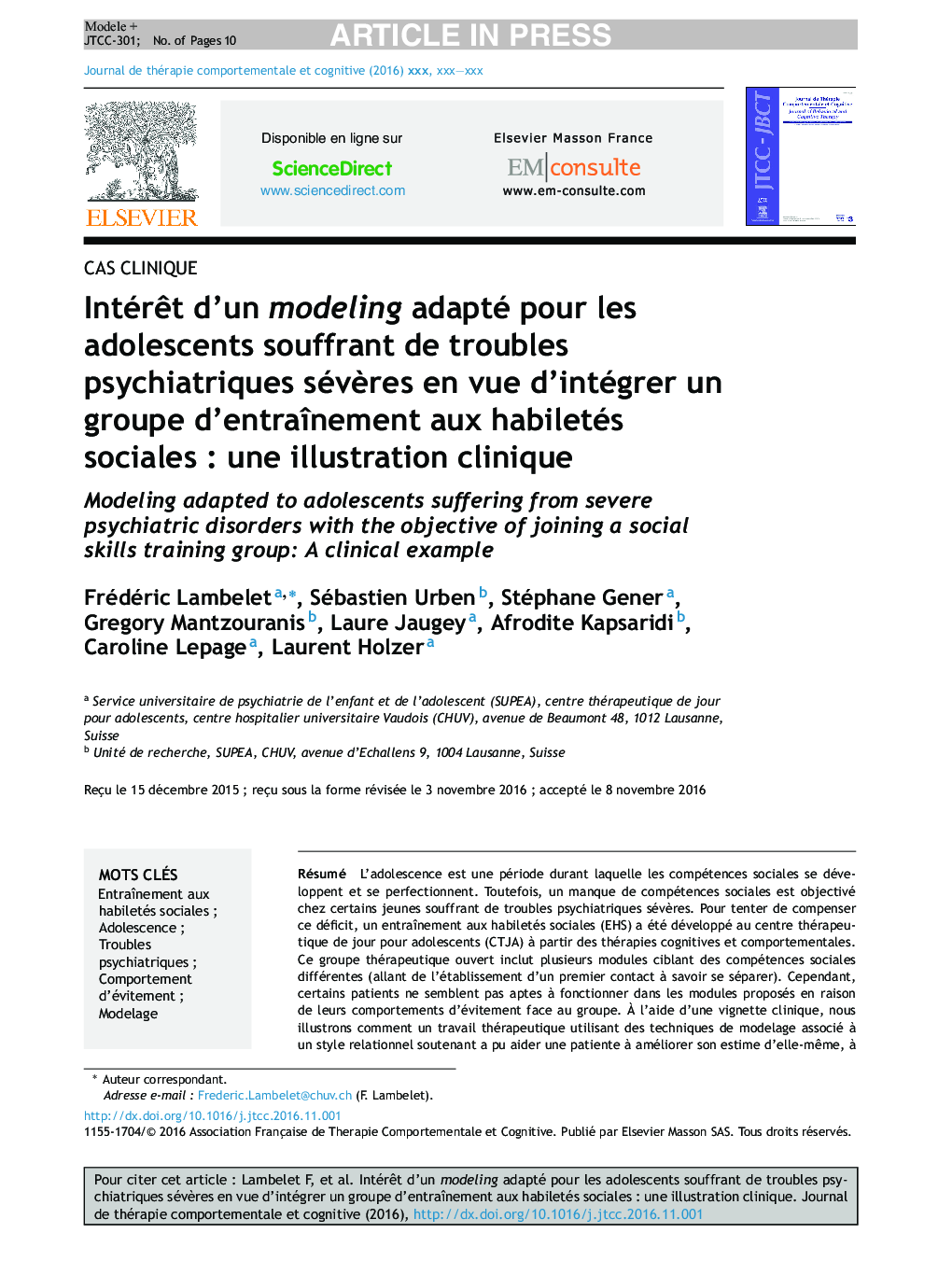| کد مقاله | کد نشریه | سال انتشار | مقاله انگلیسی | نسخه تمام متن |
|---|---|---|---|---|
| 5042844 | 1370541 | 2017 | 10 صفحه PDF | دانلود رایگان |
عنوان انگلیسی مقاله ISI
Intérêt d'un modeling adapté pour les adolescents souffrant de troubles psychiatriques sévères en vue d'intégrer un groupe d'entraînement aux habiletés sociales : une illustration clinique
دانلود مقاله + سفارش ترجمه
دانلود مقاله ISI انگلیسی
رایگان برای ایرانیان
کلمات کلیدی
موضوعات مرتبط
علوم پزشکی و سلامت
پزشکی و دندانپزشکی
روانپزشکی و بهداشت روانی
پیش نمایش صفحه اول مقاله

چکیده انگلیسی
Adolescence is a critical period for the development and perfecting of social skills, in particular through assertiveness (Alberti and Emmons, 1974). The process of socialization is necessary for the social adaptation of individuals (Favrod et al., 2000). However, a lack of social skills is documented in certain young people suffering from anxiety, mood or psychotic disorders (Rubin and Burgess, 2001). Group social skills training (SST) aims to alleviate atypical and negative social functioning (George and Vera, 1999) with positive effects on self-esteem (Seo et al., 2007). The concept of assertiveness (Hargie, 2011), which implies better self-assertion and an ability to stand up for oneself whilst respecting others, is equally particularly important in treating the mechanisms of social withdrawal and isolation with a view to social and professional integration. At the day care centre for adolescents (CTJA), which welcomes young people between the ages of 13 and 18 suffering from severe psychiatric disorders, a weekly one-and-a-half-hour group social skills workshop is offered. This workshop is an integral part of the treatment plan's therapeutic activities linked to an individualized and adapted special education teaching program. More specifically, social skills training (SST) is offered in an open group in the spirit of cooperation and rehabilitation (Bion, 1995) and consists of five modules targeting different social skills (from establishing first contact to knowing when to leave). Based on functional analysis using the French SECCA model (stimulus, emotion, cognition, behaviour, anticipation), these modules include strategies from cognitive-behavioral therapy adapted to adolescents (George and Vera, 1999), self-assertion tools (Cungi, 2005), elements of cognitive restructuring (Hope et al., 2010), as well as emotional input from the third wave of cognitive-behavioral therapies (Cottraux, 2007). However, some patients do not appear able to function in the proposed modules due to timidity, inhibition or because their disorder is too great a hindrance. In these cases, the use of different strategies is necessary to enable the young people to participate in the group. Firstly, to counteract avoidance behaviour in SST, Lieberman et al. (2005) encourage patients to understand the reasons for opposition and temporary blockage in order to treat them. Specific attention is then given to the modeling technique which corresponds to the processes resulting in imitation and whose application includes exposition to models behaving in an appropriate and socially acceptable manner (Lieberman et al., 2005). Social learning, the setting up of positive expectations, directives during the exercise, as well as the transfer of skills learnt in the everyday situations of patients favor positive reinforcement by therapists and peers. Modeling by the therapist consists of regularly communicating how the carer perceives what they imagine the emotional state of the patient to be. This technique provides an analysis of another person's position by trying to understand their cognitions and emotions in order to be more assertive (Bricout and Chaperon, 2015). A clinical vignette helps to show the way in which therapeutic work using modeling associated to a supportive relationship style and Socratic questioning (Padesky, 1993) can help a patient in terms of self-esteem, the ability to relativize the view of others and, consequently, cope with the challenges of interpersonal relationships. This article highlights the way of articulating modeling techniques and SST, as well as specific support favoring integration into therapeutic workshops. Thus, proactive investment by the care staff aimed at better accompanying patients with avoidance behaviour is to be encouraged.
ناشر
Database: Elsevier - ScienceDirect (ساینس دایرکت)
Journal: Journal de Thérapie Comportementale et Cognitive - Volume 27, Issue 2, June 2017, Pages 50-59
Journal: Journal de Thérapie Comportementale et Cognitive - Volume 27, Issue 2, June 2017, Pages 50-59
نویسندگان
Frédéric Lambelet, Sébastien Urben, Stéphane Gener, Gregory Mantzouranis, Laure Jaugey, Afrodite Kapsaridi, Caroline Lepage, Laurent Holzer,